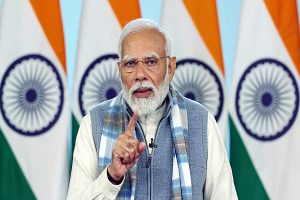The Election Commission of India (EC) was established in 1950 under Article 324 of the Constitution as a permanent independent constitutional body. It is vested with the powers of superintendence, direction and control of the preparation of electoral rolls for all Parliamentary and State elections and the office of the President and Vice President. The Commission functioned with a Chief Election Commissioner till October 16, 1989 when for the first time two additional Commissioners were appointed to create a three member body with a Chief Election Commissioner (CEC) and two Election Commissioners (ECs). Since then, the EC’s decision-making has been exercised by majority.
Article 324(5) of the Constitution ensures independence of the Commission from external political interference by stipulating that the removal of the Chief Election Commissioner from office shall be on “like manner and on the like grounds as a Judge of the Supreme Court”. The Article also specifies that any other Election Commissioner or a Regional Commissioner shall not be removed from office except on the “recommendation of the Chief Election Commissioner.” In 1990, the Goswami Committee Report on Electoral Reforms recommended that the salary and other allied matters relating to the Chief Election Commissioner and the Election Commissioners should be provided for in the Constitution itself as in the case of the Chief Justice and Judges of the Supreme Court. EC wanted an amendment to bring the removal procedures of Election Commissioners on par with the CEC to provide them with the same protection and safeguards as the Chief Election Commissioner to ensure ‘independence’ of EC as an institution, not just confined to CEC. The present constitutional guarantee requires an amendment to provide the same protection and safeguard in the matter of removal of the other two Election Commissioners as is available to the Chief Election Commissioner.
Presently, the administrative expenditure of EC is a voted expenditure unlike other independent constitutional bodies such as the Supreme Court, Comptroller & Auditor General, and Union Public Service Commission which are charged and not voted expenditure. EC wants its expenditure charged on the Consolidated Fund of India. The Election Commission (Charging of Expenses on the Consolidated Fund of India) Bill, 1994 was moved in the 10th Lok Sabha, but lapsed without being passed on the dissolution of that House in 1996. A charged budget may provide financial independence to the Commission.
Currently, the Election Commission of India has a separate secretariat of its own, with the service conditions of its officers and staff being regulated by the rules made by the President under Article 309 of the Constitution which is similar to other departments and ministries of the Government of India. The officers of the higher ranks like Deputy Election Commissioner are normally appointed on a tenure basis on deputation from the national civil services. The lower level officers are permanent officers of the Election Commission from its own ranks. The EC’s autonomy can be strengthened further if its Secretariat is also insulated from the interference of the Executive and exclusively vested with EC at par with the Secretariats of the Lok Sabha, and Rajya Sabha, Registries of the Supreme Court and High Courts etc. The Goswami Committee agreed to the suggestion and recommended a Constitutional amendment for similar provisions.
The government introduced the Constitution (Seventieth Amendment) Bill, 1990 in the Rajya Sabha to give effect to the recommendations of the Goswami Committee, but the Bill was subsequently withdrawn due to the changed composition of the EC. The Law Commission Report (2015) recommended the proposal of the Commission to have a separate independent and permanent secretarial staff.
The Representation of the People Act, 1950 needs to be amended to remove existing anomalies in registration to be included in the electoral rolls. EC has proposed specific amendments to correct the existing problems. It is responsible for the preparation and revision of electoral rolls for all the elections to Parliament and State Legislatures as per the Representation of the People Act, 1951. Similarly, the State Election Commission controls the preparation and revision of electoral rolls for elections to the local bodies. There is no uniform law or procedure to prepare the electoral rolls. Some States adopt the rolls prepared by the Commission, others prepare their rolls separately. There is duplication of work between EC and the State Election Commissions creating confusion amongst the voters. The common electoral rolls will overcome the issue and the Parliamentary and Assembly rolls can be used in the local body elections as well. The Law Commission has endorsed the above suggestions. However, this will require an amendment in the State laws pertaining to the conduct of local body elections.
The overseas electors have not been given any special voting facility. As voting in person is not a viable option for the overseas electors, a Committee appointed by the Commission recommended the facility of voting through proxy or voting through postal ballot paper with one-way electronic transmission of the ballot paper (from Returning Officer to elector) as alternative voting options for the overseas electors.
Section 31 of the Representation of the People Act, 1950 deals with penal provisions in case of false inclusion or exclusion of names in the electoral roll or false statement with imprisonment. However, there is no parallel provision in the Representation of the People Act, 1951. There may be false statements before the election authorities regarding conduct of elections. The Representation of the People Act, 1951 needs an amendment to effect similar provisions contained in Section 31 of the 1950 Act. EC proposes that making of any false statement or declaration before the Commission, the Chief Electoral Officer, the District Election Officer, Presiding Officer or any authority appointed under the Representation of the People Act, 1951 regarding electoral matters should be an electoral offence under the Act and must be punished.
Currently, a candidate to any National or State Assembly elections is required to furnish an affidavit in Form 26 appended to the Conduct of Elections Rules, 1961, containing criminal antecedents, if any, their assets, liabilities, and educational qualications. The Act provides for the penalty for false affidavit. As the false affidavits in election cases can have serious consequences, the The elector has the right to know the correct information of the candidates. Filing of false declaration about the background of the candidate undermines the very basic value of a candidate’s disclosure. EC has proposed that the punishment for a false affidavit under Section 125A should be increased to two years’ imprisonment and the election can be challenged on the ground.
In order to provide an effective deterrent against filing a false affidavit, this offence must be included in the list of ‘corrupt practices’. The Law Commission endorsed the view of EC for enhanced sentence of a minimum of two years. A person convicted of an offence including promoting enmity between classes in connection with the election, filing false affidavit, removal of ballot papers from polling stations, booth capturing or fraudulently defacing or fraudulently destroying any nomination paper.
Corrupt practices for the purposes of this Act include failure by a candidate to furnish false information or concealment of any information in the affidavit. EC wants a suitable amendment in the Act to ensure that no court shall take cognizance of any offence unless there is a complaint from the EC or CEO of the State concerned.
Biennial retirement of one third of the members in the Council of States and Legislative Councils is provided in the Constitution. EC has recommended dividing the seats in the Council of States and State Legislative Councils into three categories and specifying the term for each category in such a way that biennial retirement of 1/3rd of the members would be ensured.
Section 26 of The Representation of the People Act, 1951 empowers EC to appoint Presiding Officers and Polling Officers for polling stations in his district. There should be express provisions empowering the District Election Officers to requisition staff for conduct of elections under Section 159 of the 1951 Act. The EVM totalizer can count votes of multiple Electronic Voting Machines (EVMs) simultaneously. The totalizer is connected to EVMs via cable and it can record the votes for each of the candidates in 14 EVMs simultaneously. As per the present provisions in the Conduct of Elections Rules, 1961, votes in the EVMs are to be counted on the basis of polling stations. The voting pattern is thus known to everyone. There is a view that this can result in victimization and/or discrimination and intimidation of electors of particular localities. This issue can be addressed by the use of totalizer that can be used for ascertaining the results, as yielded by 14 EVMs without revealing the votes in individual EVMs. (Concluded)












